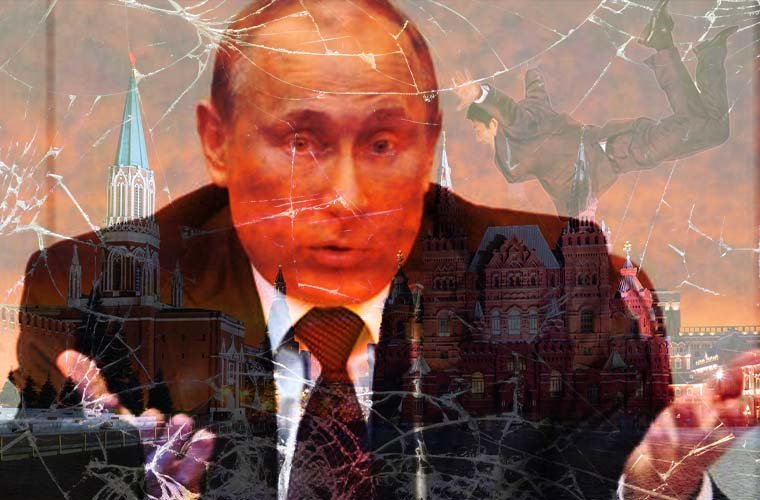The influential former head of Moscow’s Aviation Institute (MAI) Anatoly Gerashchnko, 72, died on September 21 after reportedly falling “from a great height within the walls of the university.”
A little over a week prior, on September 12, the body of Ivan Pechorin, the Aviation Director for Russia’s Far East and Arctic Development Corporation (KRDV), washed ashore near the village of Beregovoe off Amur Bay. Two days earlier, Pechorin was supposedly “resting” on his yacht when he “suddenly fell out of it at full speed.”
There aren’t any apparent connections between Gerashchenko and Pechorin, except for one intriguing thing: in the past few months, more than a dozen prominent business moguls and influential Russians have unexpectedly died under what many would deem mysterious circumstances.
Some have “fallen” out of windows or off of cliffs; others allegedly committed gruesome murder-suicides, hung themselves, or even reportedly died resulting from a drug-induced heart attack during a shamanic ritual.
Most have been leading figures from Russia’s banking and energy sectors. Some have been noteworthy critics of Russia’s President Vladimir Putin and the war in Ukraine, while others have been memorialized as “close Putin allies.”
The majority have died in Russia. However, three met their untimely end in the United Kingdom, Spain, or the United States.
It’s impossible to know right now if this string of unusual deaths is merely coincidence or, perhaps, the work of more sinister forces. And while the latter consideration might feel uncomfortably conspiratorial, the Kremlin does have a well-established history of killing off perceived enemies or “traitors.”
At the very least, it is curious to have so many prominent Russians dying under unusual circumstances in such a short period.
Here is a list of the influential Russians who have suddenly and mysterious died in the last few months:


Leonid Shulman – January 30, 2022
Shulman, 60, was the director of the transport service at Gazprom Invest, the firm which handles investment projects for the gas giant Gazprom.
Gazprom is one of the largest natural gas producers in the world and the #49 largest company in the world, according to Forbes Global 2000. The Russian state owns a majority stake in the company, and Gazprom has been accused of being a leading actor in the 2022 Russo-European gas war following the invasion of Ukraine.
According to Russian media, Shulman was found dead in the bathroom of his house in the village of Vyborgsky district of the Leningrad region. Reportedly, the energy executive was found lying face down in a bathtub “filled with blood,” with his writs cut.
Citing unnamed law enforcement sources, Russian-state media said a “clerical knife” and a notebook with two suicide notes were found near Shulman’s body.
Russian authorities ruled Shulman’s death a suicide.
Igor Nosov- February 8, 2022
Igor Nosov, 43, was the CEO of the Far East and Arctic Development Corporation (KRDV), the state agency tasked with expanding business development in Russia’s far eastern federal district.
According to a KRDV press release, Nosov died on February 8 following a stroke he had suffered a day prior.
Before being CEO of KRDV, Nosov was the Deputy Governor of the Nizhny Novgorod Region, and according to his KRDV bio, Nosov formerly held “top positions” in the governments of Moscow and the Republic of Tatarstan.
Nosov’s death has been largely overlooked by the few media outlets keeping track of the recent unusual Russian deaths. Likely, because though someone in the early 40’s suffering a stroke is relatively uncommon, it doesn’t necessarily meet the criteria for “unusual circumstances.”
However, Nosov makes The Debrief’s list for one key reason.
Nosov was the CEO of Far East and Arctic Development Corporation. The same company whose aviation director would inexplicably “fall” off his yacht and drown on September 10.
Alexander Tyulakov – February 25, 2022
One day after Putin launched a full-scale invasion of Ukraine, Alexander Tyulakov, 61, the Deputy General Director of the Unified Settlement Center of Gazprom for Corporate Security, was found hanging from a noose in the garage of his Saint Petersburg home.
According to Russian media reports, a suicide note was found near Tyulakov’s body. However, the contents of the letter have never been made public.
Gazprom nor regional law enforcement officials ever issued any public statements about Tyulakov’s death, which Russian independent newspaper Novaya Gazeta described as an apparent suicide.
Novaya Gazeta reported that shortly after Tyulakov’s body was found, Gazprom’s security service arrived and took over, corridoring off the crime scene from even local police and officials from the Investigative Committee for the Leningrad Region.
Russian media outlet Fontanka.ru also reported that Tyulakov had been seen with injuries consistent with having been badly beaten on the evening of his death. The Debrief cannot independently verify either of these accounts.
The village of Leninsky in the Vyborgsky district of the Leningrad region where Tyulakov lived is a wealthy neighborhood inhabited exclusively by Gazprom’s top management. One of Tyulakov’s former neighbors was Leonid Shulman, the Gazprom investment director who allegedly committed suicide on January 30.


Mikhail Watford (Tolstosheya) – February 28, 2022
On February 28, Watford, 66, was found dead at his sprawling Surrey mansion in the United Kingdom. A Ukrainian-born oligarch, Watford became a billionaire in the oil and gas industry following the collapse of the Soviet Union.
Watford was born Mikhail Tostosheya. However, during Putin’s rise to power in the early 2000s, the mogul moved to the United Kingdom and changed his surname to the more anglicized Watford.
In the U.K., Watford became a real estate investor, purchasing or developing several premier properties around London.
According to media reports, Watford was found hanging from a noose in the garage, similar to Gazprom executive Alexander Tyulakov three days earlier. Watford was the first unusual death of a Russian tycoon in 2022 that occurred outside of Russia.
So far, British police have said that Watford’s death is “unexplained” but not suspicious. Whatever that means.
Vasily Melinkov – March 23, 2022
On March 23, the wealthy owner of the medical supply company MedStom, Vasily Melnikov, 43, was found dead alongside his family in their upscale apartment in downtown Nizhny Novgorod.
According to Russian media outlet Kommersant, Melnikov, his wife, 41, and two children aged four and 10 had all been stabbed. The Novgorod Investigative Committee shared a photograph of a hunting knife that was believed to have been used in the quadruple homicide. Reportedly, there were no signs of forced entry or a struggle inside the apartment.
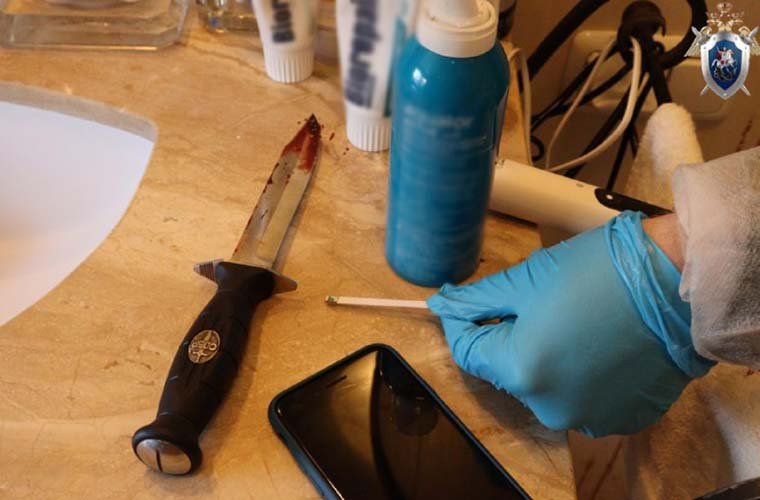

On the same day the Melnikov family’s bodies were discovered, Law enforcement officials said they had concluded that Vasily had murdered his wife and two children before taking his own life.
Sadly, this tragic case turned out to be the first in a series of gruesome scenes which saw the deaths of influential Russians and their entire families.
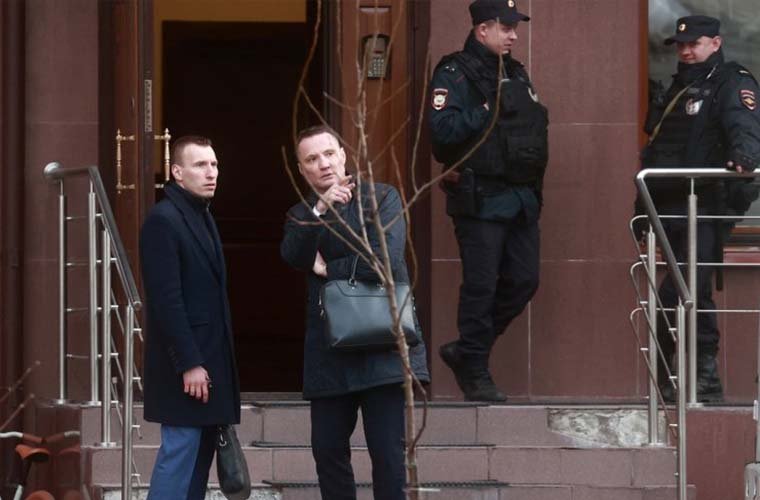

Vladislav Avayev – April 18, 2022
On April 18, Vladislav Avayev, 51, former vice president of Russia’s third-largest bank Gazprombank, his pregnant wife, and their 13-year-old daughter were found dead inside their luxury Moscow apartment. All three had been shot.
Like the Melnikov family three weeks prior, Moscow police said there were no signs of forced entry or struggle inside the apartment. The murder weapon, a “high-quality pistol,” was reportedly still clutched in Vladislav’s hand.
On the same day the crime was reported, Moscow investigators said the case was closed, declaring Vladislav had first shot his wife, then his daughter, before committing suicide.
As for possible motive, police said that Vladislav’s wife was pregnant with the family’s former driver’s baby. Moscow officials did not elaborate on how they could so quickly come to this conclusion.
Sergey Protosenya – April 19, 2022
A day after the Avayev family’s deaths, another Russian oligarch and their family were found dead, this time in Spain.
According to Spanish TV channel Telecinco, Sergey was found hanging from a guardrail in his luxury villa in Lloret de Mar, a seaside town in Catalonia, Spain. Sergey’s wife and 18-year-old daughter were found in their beds, apparently hacked to death with an ax.
A former senior executive with one of Russia’s largest natural gas producers, Novatek, Sergey was reportedly worth nearly half-a-billion dollars at the time of his death.
Officials with Mossos d’Esquadra -the police force responsible for law enforcement in the Spanish autonomous community of Catalonia- have said that murder-suicide is the leading explanation for the tragic events.
However, reportedly there were no blood stains on Sergey’s body, something one would expect to find if he had just hacked his wife and daughter to death with an ax.
Citing anonymous law enforcement sources, some Catalonian media outlets have also claimed that it appeared the perpetrator used a pair of socks, like gloves, to handle the ax used to kill Sergey’s wife and daughter. An unexpected action for someone who was likewise planning to kill themselves.
The Russian oligarch’s former employer Novatek and surviving adult son have fiercely disputed claims that Sergey killed his family before himself.
“Unfortunately, speculations have emerged in the media about this topic, but we are convinced that these speculations bear no relation to reality,” said Novatek in a press release. “We hope that the Spanish law enforcement authorities will conduct a thorough and impartial investigation to determine what happened.”
Andrei Krukovsky- May 2, 2022
On May 2, Andrei Krukovsky, 37, became the fourth Gazprom executive to suddenly die in nearly as many months.
According to Russian-state media outlet Tass, Krukovsky fell off a cliff while hiking to Aczipsinskaya Fortress. At the time of his death, Krukovsky was the executive director of the Krasnaya Polyana ski resort, owned by Gazprom. The resort was part of the Olympic complex for the 2014 Sochi Winter Olympics.
Krukovsky’s death is arguably one of the least suspicious on The Debrief’s list. However, his death is, at minimum, worth mentioning considering he was one of four top Gazprom executives to die unexpectedly from January to May.
Alexander Subbotin – May 8, 2022
Russian oligarch Alexander Subbotin, 43, has the most bizarre death on The Debrief’s list.
According to the Investigative Committee for Moscow, Subbotin died from “acute heart failure” in the suburban Moscow basement of a self-proclaimed shaman couple that goes by the names Magua Flores (real name Alexey Pindyurin) and Tina Cordoba (Kristina Teikhrib).
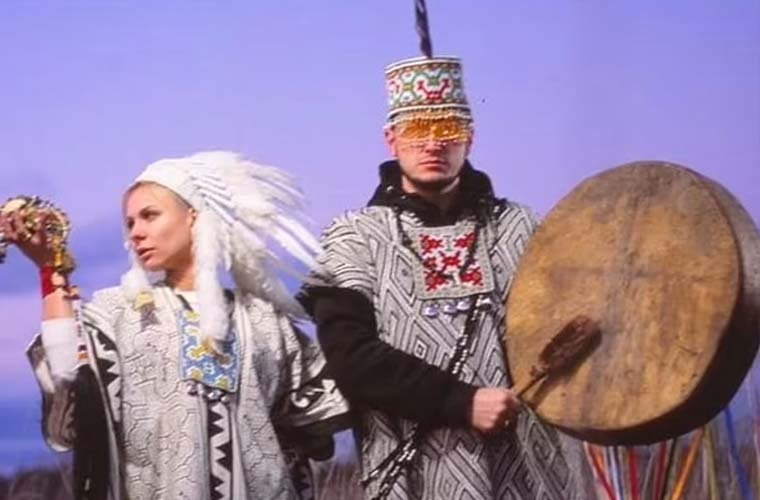

According to Moscow officials, Subbotin had undergone a shamanic ritual overseen by Flores and Cordoba to cure a severe hangover that involved injecting toad venom.
By one account, Subbotin became sick after being exposed to the toad venom and was given the herbal tranquilizer valerian. Another version of the story claims after Subbotin became ill from the toad venom, he was given a cocktail that included the powerful barbiturate Phenobarbital and valerian.
Either way, Subbotin’s lifeless body was discovered by the shamanic couple the following morning.
Before his death, Subbotin had been an influential billionaire and top manager of Lukoil, Russia’s second-largest natural gas company behind Gazprom. Reportedly, Subbotin was accompanied by “four jeeps of guards” for his fateful unorthodox hangover cure.
Yuri Voronov – July 4, 2022
Yuri Voronov, 61, was the multi-millionaire founder and general director of Astra-Shipping transport and logistics company, which holds lucrative Gazprom contracts in the Arctic.
According to Russian officials, on July 4, Voronov was found floating in the swimming pool of his luxurious mansion in the Vyborgsky district of the Leningrad region. Voronov died from an apparent gunshot wound to the head. A pistol and shell casing were reportedly found in the pool or near Voronov’s body.
According to Russian media outlet 47 News, Voronov’s wife told police that in the days leading up to his death, he had been drinking heavily and was upset over a conflict with business partners. Supposedly, Voronov had “lost a lot of money” due to contractors and business partners who “behaved dishonestly.”
Voronov’s death was ruled a suicide.
Dan Rapoport – August 14, 2022
Dan Rapoport,52, was born in the Latvian Soviet Socialist Republic of the Soviet Union. In 1980 his family was granted political asylum in the United States, and Rapoport grew up in Houston, Texas.
After the collapse of the Soviet Union, Rapoport moved to Moscow and became an influential player in Russia’s financial scene, making a fortune with investments in Russia’s oil industry.
In 2012, however, Rapoport moved back to the United States after falling out of favor with the Putin regime for supporting the opposition movements of Alexei Navalny. Until his death, Rapoport remained an outspoken critic of Putin.
In 2016, Rapoport relocated to Kyiv, Ukraine, with his second wife, Alyona, a Ukrainian virologist. After Russia invaded Ukraine in February, Rapoport’s wife and child relocated to Denmark, while he stayed in Kyiv for a time until finally moving to Washington D.C. in the summer.
On August 14, Washington D.C. Metro Police found Rapoport’s body on the sidewalk outside his luxurious West End apartment. According to police, Rapoport had died from blunt force trauma, likely due to a fall from his apartment window.
The D.C. police report said at the time of his death, Rapoport was “wearing orange flip flops and a black hat and had a cracked phone, headphones and $2,620 in cash on him, but no wallet or credit cards.”
Russian media published claims saying Rapoport was upset because his wife was leaving him and that he had released his pet dog in a park with money and a suicide note.
Rapoport’s widow Alyona has disputed these claims, and police have never mentioned anything about a suicide note or family dog.
Metro D.C. police said they have found no signs of “foul play.” However, Rapoport’s death is still under investigation.
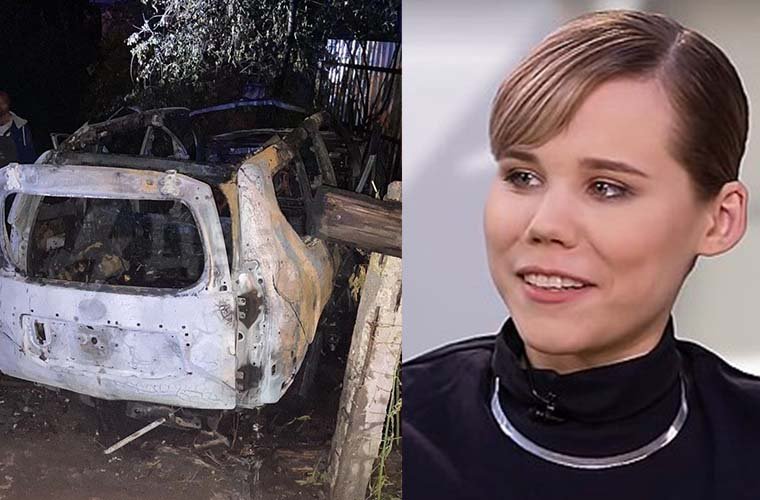

Darya Dugina – August 20, 2022
Darya Dugina, 29, was neither an influential tycoon nor a particularly prominent Russian figure. However, she was the daughter of Aleksandr Dugin, a well-known Russian ideologue and political theorist, sometimes referred to as “Putin’s brain.”
Dugin’s influence over Putin is debatable. However, thanks to his fascist ultra-nationalist ideology centered on revolutionizing Russian society against the West, Eurasianism, an obsession with occultism, and being a disheveled doppelganger to Grigori Rasputin, Dugin has successfully captured Western fascination.
In reality, Dugin is more of a villain for the West than an influential hero in Russia.
Nevertheless, on August 20, someone murdered Dugin’s only daughter, Dugina, in an assassination attempt that was potentially targeting her father.
Dugina was killed when the car she was driving exploded as she left the annual “Tradition” art festival held at the Zakharovo estate, just outside Moscow.
Dugina had attended the art festival with her more famous father, and it has been said that Dugin was supposed to be traveling with his daughter at the time of the explosion. Media reports have claimed that Dugin was spared from the blast after he abruptly decided to ride with someone else at the last minute.
Two days after her death, Russia’s federal security service, FSB, claimed that a female Ukrainian operative, in the company of her 12-year-old daughter, was responsible for Dugina’s murder. According to FSB, the woman was acting on Kyiv’s behalf and fled to Estonia after the bombing.
Days later, FSB named another Ukrainian man from Donetsk as a co-conspirator in Dugina’s murder. According to FSB, the man was part of a clandestine “Ukrainian sabotage group.” To prove their point, FSB released a photograph of the alleged assassin dressed like a pirate and hiding in the bushes with a handgun. (This is not a joke).
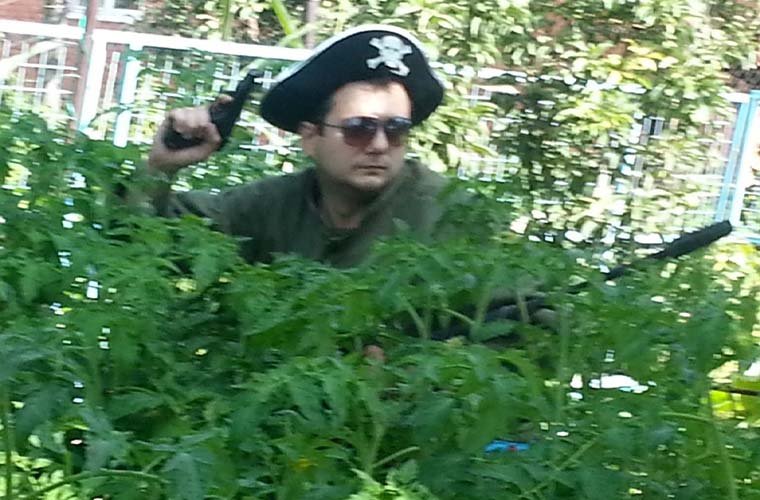

Neither of FSB’s alleged Ukrainian operatives and suspects has ever surfaced. For their part, Ukraine has emphatically denied being responsible for Dugina’s death.
Dugina is the only person on The Debrief’s list whose death was inarguably the work of professional, likely nation-state backed, assassins.
Analysis of post-blast images of Dugina’s vehicle reveals that a shaped charge explosive was likely used. This was probably a professional military-grade bomb, purpose-built to increase the chances of death to the vehicle’s occupants, and not a crude improvised explosive device (IED).
Ironically, CCTV security cameras in the VIP lot where Dugina’s car was parked before the blast were not working.
Moscow’s claim that Ukraine is responsible for Dugina’s murder makes little sense. Dugin and Dugina are virtually unknown figures in Ukraine, and it’s doubtful that Kyiv would expend the resources for a covert kill mission for either of them.
Particularly given that Ukraine is in the midst of fending off a Russian invasion, there are no strategic or tactical advantages to their deaths.
So unless you accept the Kremlin’s explanation, for now, Dugina’s murder remains a mystery.
Ravil Maganov – September 1, 2022
Ravil Maganov,67, was a Russian oligarch, billionaire, and chairman of Russia’s second-largest oil producer Lukoil.
On the morning of September 1, Maganov plunged to his death from a six-story window at Moscow’s Central Clinical Hospital. It’s unknown precisely what Maganov was receiving treatment for, but the hospital on the western outskirts of Moscow is known for treating Russia’s political and business elites.
Former Russian President Mikhail Gorbachev passed away at the same hospital a day before Maganov’s death. Ironically, President Putin was at the hospital to lay flowers beside Gorbachev’s coffin the day Maganov died.
Magano was one of the rare oligarchs who spoke out against the invasion of Ukraine, issuing a statement through Lukoil expressing sympathy for the war’s victims and calling the conflict a “tragedy.”
Russian state media outlet TASS reported Maganov’s death was a suicide, claiming he had been taking antidepressants. Baza, a Russian news site with close ties to law enforcement, said police considered the oligarch may have “slipped” from a balcony while smoking.
CCTV cameras at the hospital had been reportedly turned off for “repairs.”
Ivan Pechorin – September 10, 2022
Ivan Pechorin was the Aviation Director for Russia’s Far East and Arctic Development Corporation (KRDV).
Reportedly, Pechorin “suddenly fell” off his yacht while it was traveling “at full speed” near Cap Ignatyev in Vladivostok on September 10. Two days later, the Russian businessman’s body washed ashore near the village of Beregovoe, roughly 100 miles away.
With his apparent drowning, Pechorin became the 10th influential Russian oil industry figure to die unexpectedly in the past 9 months. Three of those ten untimely deaths involved executives associated with oil production in Russia’s far east and arctic regions, including KRDV’s CEO Igor Nosov.
Vladimir Nikolayevich Sungorkin – September 14, 2022
Vladimir Sungorkin, 67, was the editor-in-chief of the Russian state newspaper, Komsomolskaya Pravda, and so-called “top ally” of Vladimir Putin.
On September 14, Sungorkin suddenly died while on a “business trip” in the village of Roshchino in Russia’s far east. According to a colleague, Leonid Zakharov, who was with him at the time of his death, Sungorkin suddenly fell unconscious minutes after suggesting to the group he was traveling with they should “find a beautiful place somewhere… for lunch.”
“Three minutes later, Vladimir began to suffocate. We took him out for fresh air, [but] he was already unconscious… Nothing helped,” said Zakharov.
According to Zakharov, a doctor who examined Sungorkin said the editor may have suffered a stroke.
Sungorkin’s Komsomolskaya Pravda has long been a staunch pro-Kremlin outlet. In 2020, Putin called the paper “legendary,” saying Komsomolskaya had “written brilliant, unforgettable pages in the history of Russian media.”
Anatoly Gerashchenko- September 21, 2022
Anatoly Gerashchenko, 73, was the former head of Moscow’s Aviation Institute (MAI). The university is one of the top engineering institutes in Russia, spearheading Moscow’s advances in aerospace technology. Alumni of MAI form the backbone of most of Russia’s major aerospace companies.
On September 21, Gerashchenko died after “falling from a great height within the walls of the university.” Russian news outlet Izvestia said Gerashechenko was pronounced dead on scene after he went “flying [down] several flights of stairs.”
A commission has reportedly been established at the institute to examine the circumstances behind Gerashchenko’s death. A press release by MAI said his death was “the result of an accident,” adding that it was “a colossal loss for the MAI and the scientific and pedagogical community.”
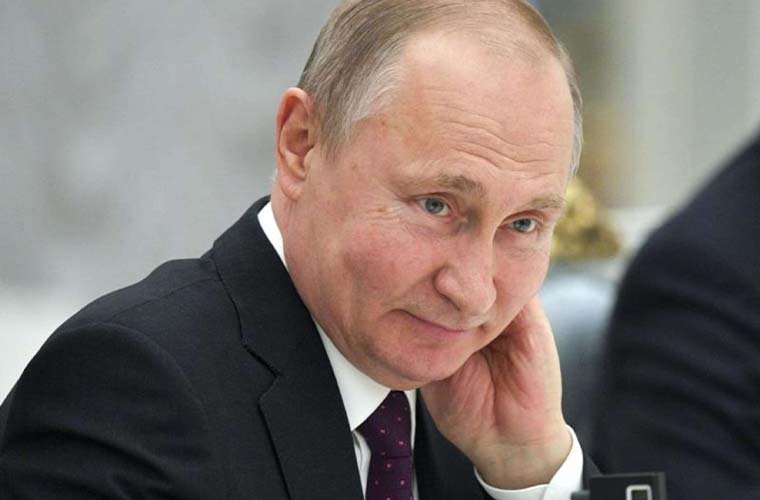

Have Prominent Russians Simply Upset The Grim Reaper or is something else going on?
On March 16, Russian President Vladimir Putin gave his first public comments following the start of Russia’s invasion of Ukraine on February 24. In a fiery speech before cabinet members, Putin recycled his usual anti-West rhetoric and claims of “Ukrainian Nazis.”
However, in a highly unusual move, the Russian president reserved his harshest language for perceived pro-Western or anti-war Russians, who Putin declared were “traitors and scum.”
“Yes, of course, they [the West] will try to bet on the so-called fifth column, on national traitors, or those who earn money here, with us, but live there, and “live” not even in the geographical sense of the word, but in their own way, thoughts, in his slavish consciousness,” hissed Putin.
Chillingly Putin said, “But any people, and even more so the Russian people, will always be able to distinguish true patriots from scum and traitors and simply spit them out like a gnat that accidentally flew into their mouths, spit them out on the floor.”
Frighteningly flirting with fascism, Putin ended his tirade by saying he was “convinced” that the “self-purification” of these supposed disloyal citizens was “natural and necessary” for the strengthening of the Russian Federation.
Shockingly, Putin’s comments were almost unambiguously directed at Russia’s wealthy oligarchs. An influential group that most tend to believe controls the power in Russia. And yet, with his harsh criticisms and threats, the president avowed that he, Vladimir Putin, is who is actually in charge.
With his comments, it’s easy to see how Putin, at least by proxy, could be responsible for some of the mysterious deaths of influential Russians in recent months. This suspicion is only compounded when you consider that 107 journalists and dozens of political opponents or spies have been murdered during Putin’s reign.
And yet, influential Russians suddenly dying under mysterious circumstances could simply be the norm.
On September 8, 2021, Russian Emergencies Minister Yevgeny Zinichev died after he “jumped off a cliff trying to save a cameraman” during training exercises in the Arctic city of Norilsk.
A 35-year-old unnamed Russian diplomat plunged to his death at the Russian embassy in Berlin on October 19, 2021. According to the investigative outlet Bellingcat, the deceased was actually an undercover FSB agent and son of FSB’s Directorate for Protection of Constitutional Order, General Alexey Zhao.
From December 2016 to August 2017, nine Russian diplomats across the globe died under sudden and bizarre circumstances, including Russia’s Ambassador to the United Nations, Vitaly Churkin.
In 2015, senior Putin advisor and founder of the media company RT, Mikhail Lesin, was found dead in a Washington D.C. hotel room. In a particularly odd twist, the D.C. chief medical examiner ruled Lesin died from “blunt force trauma” due to accidental falls from “excessive” drinking.
Essentially, influential Russians suddenly dying under unusual circumstances may only appear significant due to observational bias and increased focus on Russia following the invasion of Ukraine.
This doesn’t rule out that any or all of these deaths aren’t also the work of sinister forces. Through a proxy like FSB, Putin could be an outstanding suspect for some of the recent deaths, if indeed they are the work of organized killings.
However, as Syracuse professor of political science Dr. Brian D. Taylor points out in his book The Code of Putinism, power in Russia is predominantly held by various groups or “clans,” akin to Italian mafia families. Just like the Italian mob, feuds over different Russian economic sectors can cause all-out wars to suddenly erupt between powerful Russian clans.
This might account for some of these unusual deaths, and they could have no direct ties to the Russian president.
Of course, the sudden demise of multiple influential Russians could all be a coincidence. Aside from the obvious murders, all of these could just be bizarre natural or accidental deaths.
Though admittedly, ten out of 16 mysterious deaths involving persons directly tied to Russia’s oil industry is a conspicuous coincidence. Especially given this is one of the sectors hardest hit by Russia’s war in Ukraine.
Struggles over shrinking financial resources could be more than enough to spark a war between rival factions.
Likewise, wanting to speed up an end to the Ukrainian conflict could be an excellent incentive for oil executives to turn their back on the Kremlin. Fears of snuggling up to foreign intelligence services could make some significant players in the gas industry prime targets for Russian security services.
Ultimately, it’s likely that the unusual deaths of influential Russians are caused by a mix of unexpected natural causes, feuds between oligarch clans, and a few clandestine assassinations by the FSB. It’s, however, unlikely that we will ever know which are which.
Regardless, if history is any indication, The Debrief will probably have to keep updating its list in the coming weeks and months, as we likely haven’t seen the last influential Russian to suddenly die under mysterious circumstances.
Tim McMillan is a retired law enforcement executive, investigative reporter and co-founder of The Debrief. His writing typically focuses on defense, national security, and the Intelligence Community. You can follow Tim on Twitter: @LtTimMcMillan. Tim can be reached by email: tim@thedebrief.org or through encrypted email: LtTimMcMillan@protonmail.com
